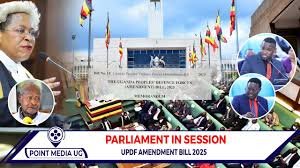In a bold and controversial move, Uganda’s Parliament passed a 2025 amendment to the Uganda People’s Defence Forces (UPDF) Act, effectively reinstating the military’s power to try civilians in military courts. This comes just months after the Supreme Court ruled in early 2025 that military trials for civilians were unconstitutional. So, what just happened, and what does it mean for ordinary Ugandans?
The War Between Parliament and the Judiciary
Back in January 2025, the Supreme Court ruled that civilians should no longer be tried in military courts. The ruling was praised as a win for constitutionalism and human rights, ordering all pending cases to be transferred to civilian courts.
“Military courts are not designed for civilians; they lack independence and fair trial guarantees,” said a human rights lawyer quoted by NTV Uganda.
The Uganda Law Society and rights activists celebrated the move, calling it a step toward reinforcing fair trial standards and judicial independence.
But the celebration didn’t last long.
President Museveni swiftly criticized the ruling as “misguided” and directed the Attorney General to draft a bill that would legally re-empower military courts. The resulting amendment, now law, has essentially reversed the Supreme Court’s directive, raising serious concerns about the separation of powers in Uganda’s governance.
“The remaining Members of Parliament who didn’t walk out, passed the Political Parties and Organizations bill and the Uganda People’s Forces Amendment Bill 2025 , Both bills now await for the president to enact it to law.” Ugandan MPs Walk Out of Parliament Defying the 2025 UPDF Amendment Bill.
What the New Law Says
The 2025 UPDF amendment law allows civilians to be tried in military courts if they are accused of offenses connected to the military, such as illegal possession of firearms or collaboration with soldiers. To placate critics, the law includes a clause that requires military court panels to include at least one legally qualified presiding officer.
Supporters argue this is necessary to maintain national security and deal with crimes involving military-grade weapons, especially with rising gun-related incidents in urban areas. But critics aren’t convinced.
A Step Backward for Human Rights?
Human rights organizations and opposition leaders are calling this law a step backward. For years, Uganda has been accused of using military courts to stifle dissent, with prominent opposition figures like Dr. Kizza Besigye and Bobi Wine facing charges in these tribunals. The fear now is that this law could be weaponized ahead of the 2026 elections to silence political rivals and activists.
Legal experts also argue that military courts lack the procedural safeguards of civilian courts. The burden of proof, access to defense, and the right to appeal are all murkier in military settings, which raises alarms about whether ordinary Ugandans can truly get a fair trial.
What Happens to the Cases Moved to Civilian Courts?
One of the biggest unanswered questions is what will happen to the cases that were moved from military to civilian courts earlier this year following the Supreme Court’s directive. Factually, there is no clear guidance yet, but given the new law, there is a strong possibility these cases could be re-transferred back to military courts, effectively undoing months of judicial restructuring.
If that happens, it would not only undermine the authority of the Supreme Court but could also discourage legal reform efforts. For defendants, it means bracing for a legal limbo, where their fate depends more on politics than justice.
With general elections looming in 2026, this law sends a powerful message about the state of democracy in Uganda. While the government frames it as a matter of national security, many see it as a power move designed to consolidate control.




